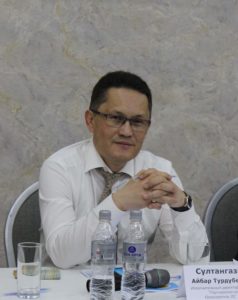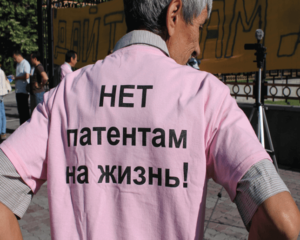
Author: Olga Ochneva, Kyrgyzstan
Kyrgyzstan is gradually switching to state drug provision system. Some of the tuberculosis medicine will be purchased out of the budgetary funds this year, and some of the antiretroviral (ARV) medicines – starting from the next year. Respective financial resources are planned to be allocated in the budget. At the same time, the question regarding the national legislation remains. A number of important documents is currently under the review. We discussed how these documents consider patients’ needs as well as the results of the analysis regarding the availability of medicines for HIV, hepatitis C and tuberculosis treatment with Aibar Sultangaziev, the representative of public council at the Ministry of Health and the Director of the Partner Network Association.
– Your organization and you personally are actively researching medicine availability and affordability. What are your successes so far?
– We started our work in 2009 with the issue of intellectual property. A respective study was conducted and, on the basis of the facts of high cost on brand medicines used for hepatitis C treatment, we advocated for the amendments to the Patent Law. In 2015, the Law was adopted; it also included the flexible provisions of the Agreement on Trade-Related Aspects of Intellectual Property Rights (TRIPS). Due to this, it became possible to bring more generic medicine into the country. To date, seven medicines have been registered. We keep the cost of hepatitis C treatment at the lowest level in the region: from 615 US dollars for a 12-week course.
Back then, the legislation lagged far behind the needs. We developed an intra-organizational strategy for ensuring the availability of medicines and started to work in several directions. In 2014, we approved the clinical guidelines for the treatment of hepatitis C that became a clinical protocol in 2016 that included a full range of medicine available within the country. Hepatitis C treatment was added to the State Program on HIV/AIDS, and from 2018 onwards, 150 people living with HIV (PLHIV) will receive it free of charge annually. We participated in the revision of protocols on HIV treatment, and now they include modern and inexpensive medicine, such as dolutegravir, darunavir, rilpivirine.
– The Essential Drugs List (EDL) is currently undergoing a revision. It is an important document related to the availability and affordability of medicines and holding public procurement. Did you participate in its elaboration?

– In 2015, we conducted a study on five diseases: HIV, tuberculosis, hepatitis C, oncological diseases, conditions after transplantation, and found out what medicines for their treatment were registered in the country or included to the EDL and clinical protocols. We identified the differences between the WHO recommendations and the situation in the country, and then submitted a List of necessary medicines to the Ministry of Health (MoH). All of them were added to the EDL and will be approved soon after several amendments to the Law on Circulation of Medicines are introduced. By the way, the Law provides a List of medicines that can be imported and used in the country without registration. This List is used for socially significant diseases, and, as part of the working group of the MoH, we are currently working to determine the procedure for its formation.
– Will it allow the pharmacological companies not to register medicine in Kyrgyzstan?
– Registration is needed. However, in cases when the government urgently needs medicines that are not available on the market, it will be possible to legalize them by the decision of the commission without registration. Of course, there are criteria: medicine must be of high quality, prequalified by the WHO, etc. This list already exists. Last year in November, together with UNDP, (the organization manages grants of the Global Fund in the country – author’s remark), we submitted a list of 12 essential tuberculosis and antiretroviral medicines for the Ministry of Health to consider the possibility of importing them. This is a matter of political will and one commission’s meeting, but there has been no progress with the documents yet. That is why we are preparing a new regulation so that another commission could formalize it via a new procedure.
– Does it mean that practically all conditions for public procurement are in place?

– A lot has been done but the risks still remain. We have to make every effort to regulate the process by autumn. The point is that this year the state’s responsibility is to purchase 10% of second-line tuberculosis medicines, none of which has yet been registered in the country. In 2019, the state should purchase 20% of the required amount of ARV medicines, and in 2020 the share will increase up to 30%. Not all pharmacological companies enter the national small market, and those that do, inflate prices. We are determined to promote the possibility of medicine purchase through international mechanisms. For example, if Kyrgyzstan purchases medicines through UNICEF, one can expect a 5-7-fold decrease of the cost since UNICEF places a single long-term order that covers several countries with the medicine producers.
– What other plans do you have and what is the ultimate goal of your work?
– We carry out constant monitoring of procurement. Price regulation remains one of the priority tasks. We want people to have unhindered access to inexpensive and effective treatment, and the state to provide medicines for socially significant diseases.



